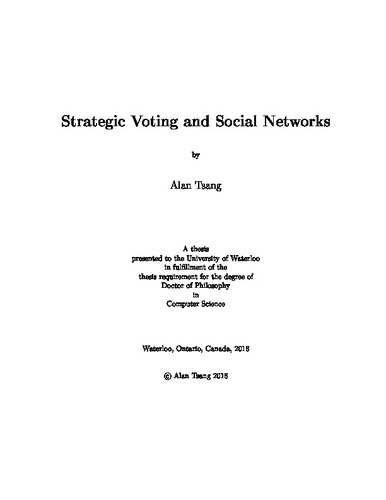| dc.description.abstract | With the ever increasing ubiquity of social networks in our everyday lives, comes an increasing urgency for us to understand their impact on human behavior. Social networks quantify the ways in which we communicate with each other, and therefore shape the flow of information through the community. It is this same flow of information that we utilize to make sound, strategic decisions. This thesis focuses on one particular type of decisions: voting. When a community engages in voting, it is soliciting the opinions of its members, who present it in the form of a ballot. The community may then choose a course of action based on the submitted ballots. Individual voters, however, are under no obligation to submit sincere ballots that accurately reflects their opinions; they may instead submit a strategic ballot in hopes of affecting the election's outcome to their advantage. This thesis examines the interplay between social network structure and strategic voting behavior. In particular, we will explore how social network structure affects the flow of information through a population, and thereby affect the strategic behavior of voters, and ultimately, the outcomes of elections.
We will begin by considering how network structure affects information propagation. This work builds upon the rich body of literature called opinion dynamics by proposing a model for skeptical agents --- agents that distrust other agents for holding opinions that differ too wildly from their own. We show that network structure is one of several factors that affects the degree of penetration that radical opinions can achieve through the community. Next, we propose a model for strategic voting in social networks, where voters are self-interested and rational, but may only use the limited information available through their social network contacts to formulate strategic ballots. In particular, we study the ``Echo Chamber Effect'', the tendency for humans to favor connections with similar people, and show that it leads to the election of less suitable candidates. We also extend this voter model by using boundedly-rational heuristics to scale up our simulations to larger populations. We propose a general framework for voting agents embedded in social networks, and show that our heuristic models can demonstrate a variation of the ``Micromega Law'' which relates the popularity of smaller parties to the size of the population. Finally, we examine another avenue for strategic behavior: choosing when to cast your vote. We propose a type of voting mechanism called ``Sticker Voting'', where voters cast ballots by placing stickers on their favored alternatives, thereby publicly and irrevocably declaring their support. We present a complete analysis of several simple instances of the Sticker Voting game and discuss how our results reflect human voting behavior. | en |

